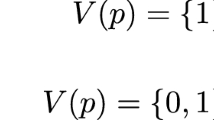Abstract
We construct logical languages which allow one to represent a variety of possible types of changes affecting the information states of agents in a multi-agent setting. We formalize these changes by defining a notion of epistemic program. The languages are two-sorted sets that contain not only sentences but also actions or programs. This is as in dynamic logic, and indeed our languages are not significantly more complicated than dynamic logics. But the semantics is more complicated. In general, the semantics of an epistemic program is what we call aprogram model. This is a Kripke model of ‘actions’,representing the agents' uncertainty about the current action in a similar way that Kripke models of ‘states’ are commonly used in epistemic logic to represent the agents' uncertainty about the current state of the system. Program models induce changes affecting agents' information, which we represent as changes of the state model, called epistemic updates. Formally, an update consists of two operations: the first is called the update map, and it takes every state model to another state model, called the updated model; the second gives, for each input state model, a transition relation between the states of that model and the states of the updated model.
Each variety of epistemic actions, such as public announcements or completely private announcements to groups, gives what we call an action signature, and then each family of action signatures gives a logical language. The construction of these languages is the main topic of this paper. We also mention the systems that capture the valid sentences of our logics. But we defer to a separate paper the completeness proof.
The basic operation used in the semantics is called the update product. A version of this was introduced in Baltag et al. (1998), and the presentation here improves on the earlier one. The update product is used to obtain from any program model the corresponding epistemic update, thus allowing us to compute changes of information or belief. This point is of interest independently of our logical languages. We illustrate the update product and our logical languages with many examples throughout the paper.
Similar content being viewed by others
REFERENCES
Baltag, Alexandru: 1999, ‘A Logic of Epistemic Actions’, (Electronic) Proceedings of the FACAS workshop, held at ESSLLI'99, Utrecht University, Utrecht.
Baltag, Alexandru: 2001, ‘Logics for Insecure Communication’, in J. van Bentham (ed.) Proceedings of the Eighth Conference on Rationality and Knowledge (TARK'01), Morgan Kaufmann, Los Altos, pp. 111–122.
Baltag, Alexandru: 2002, ‘A Logic for Suspicious Players: Epistemic Actions and Belief Updates in Games’, Bulletin Of Economic Research 54(1), 1–46.
Baltag, Alexandru: 2003, ‘A Coalgebraic Semantics for Epistemic Programs’, in Proceedings of CMCS'03, Electronic Notes in Theoretical Computer Science 82(1), 315–335.
Baltag, Alexandru: 2003, Logics for Communication: Reasoning about Information Flow in Dialogue Games. Course presented at NASSLLI'03. Available at http://www.indiana.edu/~nasslli.
Baltag, Alexandru, Lawrence S. Moss, and Sławomir Solecki: 1998, ‘The Logic of Common Knowledge, Public Announcements, and Private Suspicions’, in I. Gilboa (ed.), Proceedings of the 7th Conference on Theoretical Aspects of Rationality and Knowledge (TARK'98), pp. 43–56.
Baltag, Alexandru, Lawrence S. Moss, and Sławomir Solecki: 2003, ‘The Logic of Epistemic Actions: Completeness, Decidability, Expressivity’, manuscript.
Fagin, Ronald, Joseph Y. Halpern, Yoram Moses, and Moshe Y. Vardi: 1996, Reasoning About Knowledge, MIT Press.
Fischer, Michael J. and Richard E. Ladner: 1979, ‘Propositional Modal Logic of Programs’, J. Comput. System Sci. 18(2), 194–211.
Gerbrandy, Jelle: 1999a, ‘Dynamic Epistemic Logic’, in Lawrence S. Moss, et al (eds), Logic, Language, and Information, Vol. 2, CSLI Publications, Stanford University.
Gerbrandy, Jelle: 1999b, Bisimulations on Planet Kripke, Ph.D. dissertation, University of Amsterdam.
Gerbrandy, Jelle and Willem Groeneveld: 1997, ‘Reasoning about Information Change', J. Logic, Language, and Information 6, 147–169.
Gochet, P. and P. Gribomont: 2003, ‘Epistemic Logic’, manuscript.
Kooi, Barteld P.: 2003, Knowledge, Chance, and Change, Ph.D. dissertation, University of Groningen.
Meyer, J.-J. and W. van der Hoek: 1995, Epistemic Logic for AI and Computer Science, Cambridge University Press, Cambridge.
Miller, Joseph S. and Lawrence S. Moss: 2003, ‘The Undecidability of Iterated Modal Relativization’, Indiana University Computer Science Department Technical Report 586.
Moss, Lawrence S.: 1999, ‘From Hypersets to Kripke Models in Logics of Announcements’, in J. Gerbrandy et al. (eds), JFAK. Essays Dedicated to Johan van Benthem on the Occasion of his 60th Birthday, Vossiuspers, Amsterdam University Press.
Plaza, Jan: 1989, ‘Logics of Public Communications’, Proceedings, 4th International Symposium on Methodologies for Intelligent Systems.
Pratt, Vaughn R.: 1976, ‘Semantical Considerations on Floyd-Hoare Logic’, in 7th Annual Symposium on Foundations of Computer Science, IEEE Comput. Soc., Long Beach, CA, pp. 109–121.
van Benthem, Johan: 2000, ‘Update Delights’, manuscript.
van Benthem, Johan: 2002, ‘Games in Dynamic Epistemic Logic’, Bulletin of Economic Research 53(4), 219–248.
van Benthem, Johan: 2003, ‘Logic for Information update’, in J. van Bentham (ed.) Proceedings of the Eighth Conference on Rationality and Knowledge (TARK'01), Morgan Kaufmann, Los Altos, pp. 51–68.
van Ditmarsch, Hans P.: 2000, ‘Knowledge Games’, Ph.D. dissertation, University of Groningen.
van Ditmarsch, Hans P.: 2001, ‘Knowledge Games’, Bulletin of Economic Research 53(4), 249–273.
van Ditmarsch, Hans P., W. van der Hoek, and B. P. Kooi: 2003, in V. F. Hendricks et al. (eds), Concurrent Dynamic Epistemic Logic, Synt. Lib. vol. 322, Kluwer Academic Publishers.
Author information
Authors and Affiliations
Rights and permissions
About this article
Cite this article
Baltag, A., Moss, L.S. Logics for Epistemic Programs. Synthese 139, 165–224 (2004). https://doi.org/10.1023/B:SYNT.0000024912.56773.5e
Issue Date:
DOI: https://doi.org/10.1023/B:SYNT.0000024912.56773.5e




